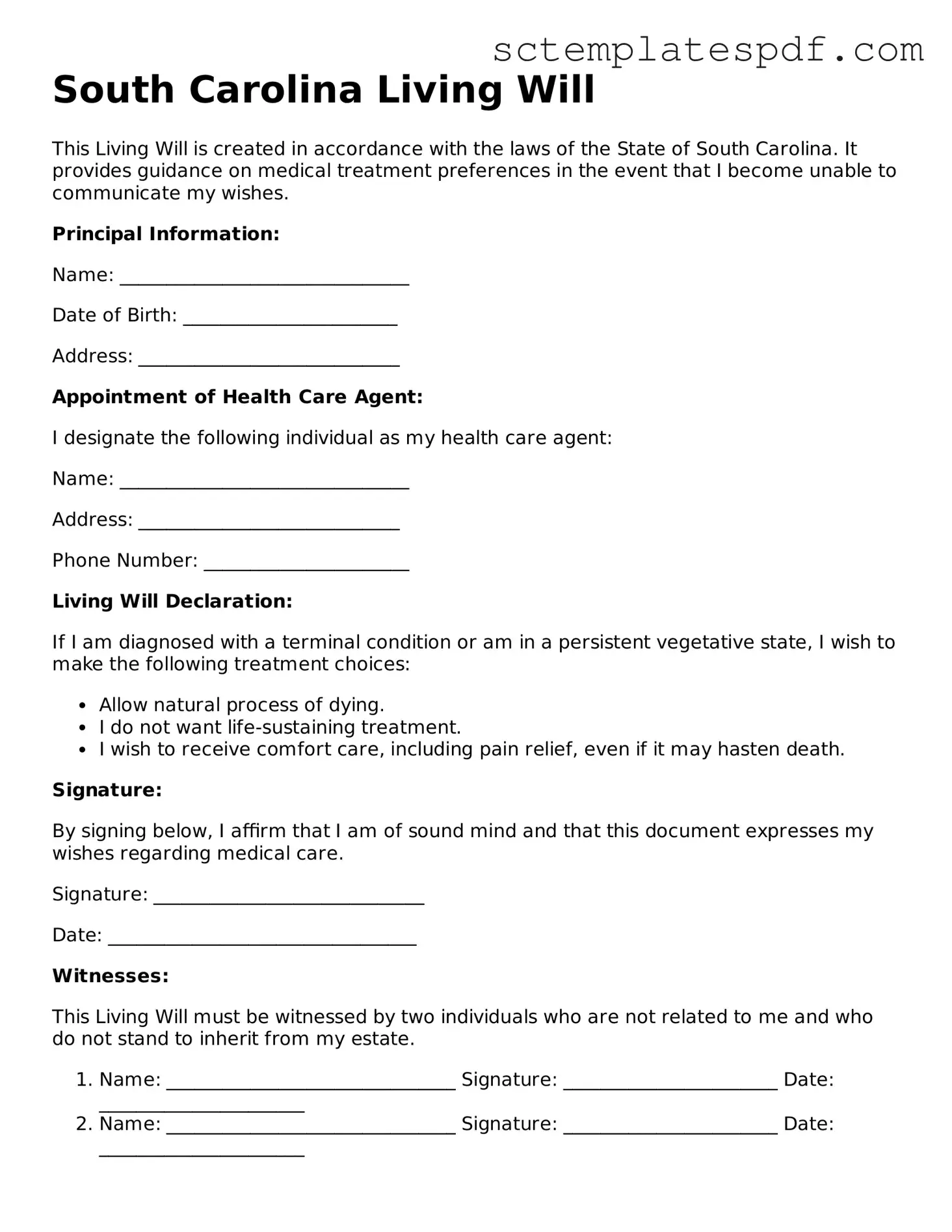Valid South Carolina Living Will Document
In South Carolina, a Living Will is a crucial document that allows individuals to express their wishes regarding medical treatment in situations where they may be unable to communicate those preferences themselves. This form is particularly important for ensuring that your healthcare decisions are respected during critical moments, such as terminal illness or severe incapacitation. It outlines the types of medical interventions you would or would not want, including life-sustaining treatments, resuscitation efforts, and other critical care measures. By completing a Living Will, you can provide clear guidance to your loved ones and healthcare providers, alleviating the burden of making difficult decisions on your behalf. Furthermore, the form must be signed in the presence of two witnesses or a notary public to be legally binding. Understanding the nuances of this document is essential for anyone looking to take control of their healthcare choices and ensure their values are honored in times of crisis.
Key takeaways
Filling out a South Carolina Living Will form is an important step in planning for your future healthcare decisions. Here are some key takeaways to keep in mind:
- Understand the Purpose: A Living Will outlines your preferences regarding medical treatment in situations where you may be unable to communicate your wishes. This document is crucial for ensuring that your healthcare aligns with your values and desires.
- Eligibility Requirements: In South Carolina, you must be at least 18 years old and of sound mind to create a Living Will. This ensures that you have the legal capacity to make informed decisions about your medical care.
- Clear Instructions: When completing the form, provide specific instructions about the types of medical treatment you want or do not want. This clarity helps healthcare providers and your loved ones understand your wishes during critical moments.
- Review and Update: It’s advisable to review your Living Will periodically, especially after major life events such as marriage, divorce, or a significant change in health. Keeping your document up to date ensures that it reflects your current preferences.
Dos and Don'ts
When filling out the South Carolina Living Will form, it's important to approach the task with care. Here are some guidelines to help you navigate the process effectively.
- Do clearly state your wishes regarding medical treatment. Make sure your preferences are easy to understand.
- Do discuss your wishes with your family and loved ones. This ensures everyone is aware of your decisions.
- Do sign the form in front of a notary public or witnesses, as required by South Carolina law. This step is crucial for the document's validity.
- Do keep a copy of the completed form in a safe place and share it with your healthcare provider.
- Don't use vague language. Be specific about the types of treatments you want or do not want.
- Don't forget to review and update your Living Will as your preferences or circumstances change.
By following these dos and don’ts, you can ensure that your Living Will accurately reflects your wishes and provides guidance to your loved ones and healthcare providers when needed.
Guidelines on Utilizing South Carolina Living Will
Filling out the South Carolina Living Will form is an important step in expressing your healthcare wishes. After completing the form, you will need to ensure it is signed and witnessed properly to make it legally binding. Here’s how to fill out the form step by step.
- Obtain the Form: Start by getting a copy of the South Carolina Living Will form. You can find it online or request it from your healthcare provider.
- Read the Instructions: Before filling it out, carefully read any instructions provided with the form to understand what information is required.
- Provide Your Information: Fill in your full name, address, and date of birth at the top of the form. This identifies you as the person making the living will.
- Specify Your Wishes: Clearly state your healthcare preferences regarding life-sustaining treatments. Be specific about what types of treatments you do or do not want.
- Choose a Healthcare Proxy: If desired, designate someone to make healthcare decisions on your behalf if you are unable to do so. Include their name and contact information.
- Sign the Form: After you’ve completed the form, sign and date it at the designated area. Your signature is crucial for the document’s validity.
- Witness Requirements: Have at least two witnesses sign the form. They must be individuals who are not related to you and who will not benefit from your estate.
- Make Copies: Once the form is signed and witnessed, make several copies. Keep one for your records and provide copies to your healthcare proxy and medical providers.
Once you’ve completed these steps, your Living Will is ready to be used. Make sure to discuss your wishes with your loved ones and healthcare providers to ensure everyone is informed about your decisions.
Other Popular South Carolina Forms
Do You Have to Be Separated for a Year to Get a Divorce in Sc - The agreement can set a framework for future relationship dynamics, especially if children are involved.
South Carolina Boat Bill of Sale - It's advisable to record the sale with local authorities in certain states.
A Missouri Quitclaim Deed is a legal document used to transfer ownership of real estate from one party to another without guaranteeing that the title is clear. This form is often utilized in situations where the parties know each other, such as family transfers or divorces. To aid in this process, you can access essential documents through Missouri PDF Forms. If you need to complete a Quitclaim Deed, click the button below to get started.
Sc Lease Agreement - A lease may specify the consequences of non-payment or breach of terms.
